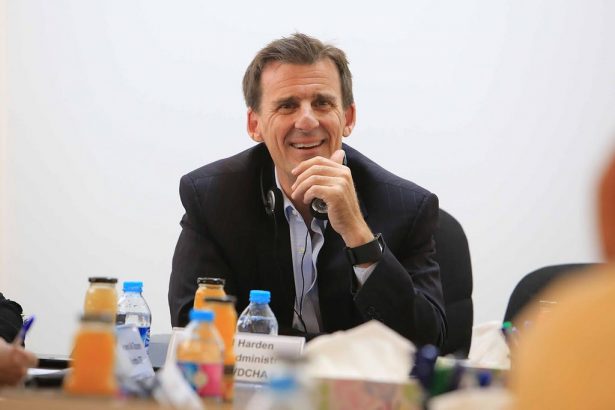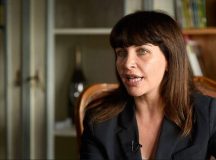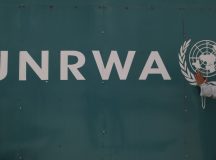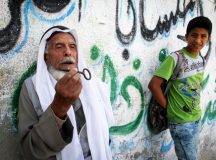Dave Harden is managing director of the Georgetown Strategy Group. He has led USAID programmes in Yemen, Syria, Iraq, Libya, the West Bank and Gaza, and worked very closely with many of the UN agencies, including UNRWA, the UN Relief and Works Agency for Palestine Refugees in the Near East and the IDF during the 2014 Gaza conflict. In this interview with Fathom’s Daniel Tuhrim, Harden explores the range of possible consequences of the Trump administration’s decision to cut all funding to UNRWA, as well as to East Jerusalem hospitals and people-to-people coexistence projects, warning ‘if that funding gap isn’t filled by other donors, it will certainly be filled by Hamas and other rejectionists.’ He calls instead for a planned 10-year phase out of UNRWA that avoids harm to the Palestinian and to the prospects for peace. Download a PDF version here.
Trump and UNRWA
Daniel Tuhrim: Why do you think the Trump administration has suspended aid to UNRWA, the hospitals and the coexistence projects?
Dave Harden: I think US President Donald Trump believed it would be a leverage point he could use with Palestinian Authority (PA) President Mahmoud Abbas. But I cannot see how this can work. The money doesn’t even go to the PA, and so doesn’t benefit Abbas (other than security assistance which the US will continue to fund). At a certain point, the Palestinians will be unable to accept the security assistance if they are not getting any bilateral assistance because they will be perceived as the police force of the Israeli occupation, losing their legitimacy in Palestinian circles. Moreover, the funding cuts to the East Jerusalem hospital networks, such as the Augusta Victoria Hospital (which are Israeli licensed and administrated institutions but which are culturally Palestinian) will put stress on the entire Jerusalem health system and pressure is going to ripple over to Hadassah Hospital (which a few years ago almost went bankrupt) and Shaare Zedek Hospital. The decision to cut funds was unnecessary. And by cutting people-to-people grants, the US administration undermined the whole idea of the congressional appropriation of funds for these activities, whose purpose was to bring Palestinians and Israelis together to begin to work through their challenges at the grassroots level.
DT: What will be the consequences of Trump’s decisions?
DH: The financial gaps might be closed by other countries and donors, in which case the US will be completely irrelevant to the debate about what UNRWA is or should be. For example, if the EU or Gulf donors step in, then they will legitimately get to set the UNRWA agenda. And in such a scenario it might be that the Israelis will conclude it would have been better had the US ‘stayed in’ in order to be part of the debate rather than leave that space to others.
The other possibility is that the UNRWA funding gap is not filled, in which case Hamas will close the gap and increase the potential for violence. Currently there is no plan; there is simply an American decision to cut funding and ‘good luck everybody’. Bottom line – if that gap isn’t filled by donor countries, it will certainly be filled by Hamas and other rejectionists.
Abbas is reportedly contemplating limiting the subsidies the PA gives to Gaza, which is around $96m per year, and frankly that decision is not even crazy. The PA is financially strapped, UNRWA is handicapped, and the US has ended all bilateral assistance (barring security) to the Palestinian people.
If Abbas does pull PA funding to Gaza, we will be left with a horrific, dark and dangerous environment in Gaza that will be a profound threat to Gazans and Israelis. Hamas’ capabilities and their ability to project power into Israel and disrupt daily life through targeted missile strikes has improved over three wars and there is no reason to believe this trend will not continue.
UNRWA: Strengths and Weaknesses
DT: You have been supportive of some components of the work of UNRWA. What does UNRWA do well?
DH: UNRWA helps the most vulnerable people and provides important food, healthcare and welfare benefits, particularly in Gaza. In addition – and this is missed by the majority of commentators – UNRWA has a unique infrastructure and system in place that allows it to respond to emergencies unlike any other entity.
During the 2014 war, when power and water went down and there was no civilian protection space, UNRWA was able to do the heavy lifting and protect civilians better than any other UN or bilateral development agency. That was recognised by the Israeli military. On a geo-strategic level, Israel’s security establishment and I think very similarly. We both understand the political role of economic opportunity.
DT: At the same time, you have also said that UNRWA has ‘ossified to create welfare dependency’. What are the problems with the organisation? And would you agree with Nikki Haley’s tweet that UNRWA is ‘a political arm’ (though of what she did not say)?
DH: Is UNRWA political? Well, it was established under the auspices of the UN General Assembly in the context of the Israeli-Palestinian conflict so there is inevitably a political element. It is 70 years old, ossified, and needs to be substantially reformed and re-envisioned. It subsidises dysfunctionality and creates welfare dependency. So we need concrete solutions to bridge the gaps between Israelis and Palestinians.
How to phase out UNRWA
DT: You oppose the US administration cuts to UNRWA and suggest an alternative strategy: what is it?
DH: I propose a 10-year ‘phase out’ of UNRWA. We have to look at the Palestinian diaspora in the region on a country-by-country basis and develop appropriate solutions for each. For example, alleviating the situation in Jordan, where two million Palestinian refugees have political, economic and social rights (and are therefore more integrated) is easier to do than in Lebanon where the refugees are without rights and unintegrated. And both of those cases are different to the situation of refugees in the West Bank, Gaza and Syria. It is more complicated than simply saying no to UNRWA.
Jordan and Syria
In Jordan I propose that the UN, through UNRWA, fund a 10-year block grant to Jordan at $500 million per year. In Syria, I recommend moving refugee operations from UNRWA to the UN High Commission for Refugees (UNHCR). The UNHCR has the mandate to protect refugees and to assist in their voluntary repatriation, local integration, or resettlement to a third country. It is logical to treat the Palestinian refugees in Syria as part of the larger operation being run there by the UNHCR. Moreover, because UNHCR runs a global operation it is attuned to best practices, and more able to innovate, for example by using technologies to improve the delivery of outcomes.
Gaza
Regarding Gaza, I don’t think the population want another three generations of food baskets. I believe they would like dignity and economic well-being, and of course they have political aspirations. After 15 years of trying it is clear that economic pressure in Gaza does not yield political change. In fact, economic pressure is more likely to create instability, violence, chaos, and greater risk to Gazans and Israelis. Therefore, I propose significantly strengthening the private sector. In this context a model could be Jenin and Jalameh in the northern West Bank, where trade was the catalyst for political, economic and social transformation. I think that’s also possible in Gaza.
The West Bank
The responsibility for taking care of Palestinian refugees living in the West Bank should eventually be the responsibility of the PA. Right now, they could not afford to do so, so someone is going to have to pay for health, education and welfare benefits, whether it is the international community, the Israelis or Hamas. Whoever does, we must be aware that continued assistance without a political horizon subsidises dysfunctionality.
Lebanon
It is very difficult to develop solutions for the Palestinian refugees in Lebanon without threatening the delicate religious and demographic balance in the country. The situation is already on a razor’s edge and adding the Palestinian demographic could be extremely dangerous. I propose for the time being that UNHCR begin the transition of UNRWA operations over the next few years.
Aid Matters
DT: You were responsible for USAID administered aid to Israeli/Palestinian NGOs for 11 years. What were your aims and what did USAID achieve?
DH: Our fundamental aim was to close gaps between Israelis and Palestinians by creating Palestinian institutions for eventual statehood and by eliminating friction points between Israelis and Palestinians. For example, we advanced water initiatives that expanded access to and quality of water. We changed the nature of the water question from a zero-sum negotiation of a scarce resource once we ensured that there was enough water between the Mediterranean and the Jordan River, so it just became a question of distribution.
We also expanded economic opportunities in a way that benefited small and medium-sized businesses – the best example of that was opening up Jenin and Jalameh as a trading corridor where unemployment went from 50 per cent to 20 per cent, as local leaders and businesses took control of their town and its future, as opposed to rejectionist militias.
It is vital to ensure accountability and transparency in the use of US funds. In August, the Congressional General Accountability Office (GAO) published a report about my last two years in running US funds for Palestinian assistances with no recommendations for improvements and a widespread recognition that the mission was operating in a superior and effective manner, proactively managing tax dollars for US objectives.
DT: If there were to be a return to US bilateral assistance, where should it be directed?
DH: It partially depends on whether there is a political horizon. If there is, I would recommend renewing support to the governing institutions that would allow a Palestinian state to emerge, similar to the policy during the Salam Fayyad era. But I think this is unlikely.
In either scenario I would expand private sector capability in Gaza and the West Bank, including predictable, secure and efficient access through Israel to world markets in a way that protects Israel’s security but also provides a level of confidence to Palestinian business leaders. I would also try to reduce gaps that are friction points between both sides, including continuing our work on water, and continuing with security coordination. Related to that, I would work very hard to remove all incitement in the education sector and to ensure it is open to the global economy. If the US disengages, and defaults to the most extreme elements of Israeli society, we will have not served US or Israeli interests. We will only have helped perpetrate feelings of despair.




































